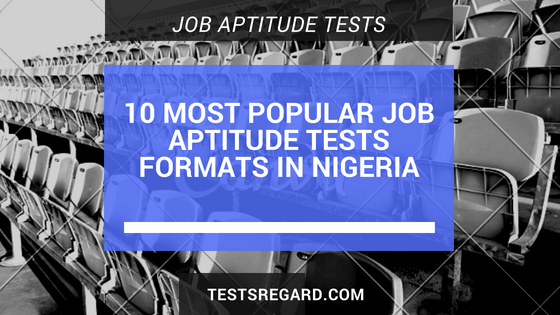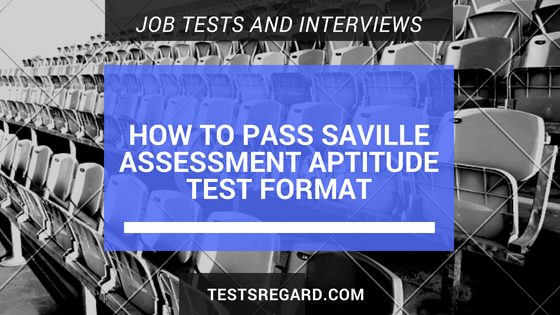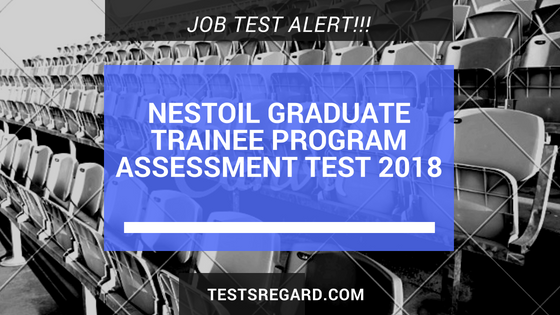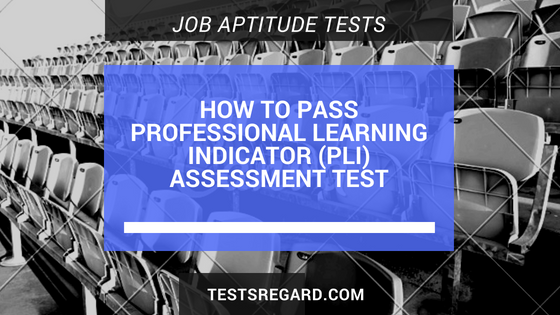10 Most Popular Job Aptitude Tests Formats In Nigeria
Quite a number of companies deem it expedient to set aptitude tests when throwing a job position open. Aptitude tests are organised for the purpose of assessing recruits based on diverse skills and abilities. Such assessment could include language skills, behavioural skills, problem-solving skills, critical reasoning capacity, and a host of others.
How does a company get to separate the men from the boys? It is by administering job aptitude tests. It is safe to say that in a country like Nigeria, almost all topnotch organisations administer aptitude tests.
If you are applying for a position in a company, chances you are going to write an aptitude test are very high. In order to stand at a vantage position at getting a job, your performance during a job aptitude test has to be outstanding. If you have no idea on what aptitude tests seem like, this article is for you. Below are popular aptitude tests used by companies in Nigeria.
APTITUDE TESTS FORMATS USED BY NIGERIAN COMPANIES
1. THE PREDICTIVE INDEX LEARNING INDICATOR (PLI):
The predictive index learning indicator is an operative tool that weighs one’s level of cognition, ability to adapt to the job and ability to learn. This kind of test seeks to know how fast one can learn a new job. Its format includes Numerical reasoning, verbal reasoning and non-verbal reasoning. Read on how to pass PLI assessment tests.
2. SHL:
SHL is a top brand of psychometric tests used by quite a lot of companies. SHL aims at assessing a candidate’s psychometric ability. Tests here include numerical, verbal, inductive reasoning and diagrammatic tests. Total score, speed and accuracy are checked during the exam. You can Get SHL Past Questions Here. You can as well read more on how to pass SHL tests.
3. THE GRADUATE MANAGEMENT ADMISSION TEST (GMAT):
Just like the TalentQ test, this is an adaptive test that is used in evaluating a candidate’s quantitative, verbal and reading ability. If you want to learn more about GMAT test format, get the GMAT Past Questions.
Quantitative: An individual’s knowledge of Mathematics is being tested here and this comprises arithmetic, data analysis, word problems, etc. Read further on Quantitative reasoning questions.
Verbal: An individual’s knowledge of the use of English is being tested here. Read more on Verbal Reasoning Tests.
Critical Thinking: A candidate’s ability to evaluate and construct arguments are being judged through this test. Read more on logical reasoning tests.
You can as well read more on how to pass GMAT tests. And make sure you Download GMAT Test Past Questions.
4. LESAT (LAWYERS’ EMPLOYMENT SUITABILITY APTITUDE TEST):
LESAT helps employers to make more objective choices by focusing on the candidates’ aptitude for a career in law. It is used to determine the skills required in the profession. The LESAT consists of six multiple-choice sections: comprehension, interpretation, analysis, synthesis, induction, and deduction. The six multiple-choice questions can be seen in any format:
- THE STRUCTURE OF THE COMPREHENSION SECTION: This tests the docility of a candidate to understand the system of a long and twisted plot; as it is certain they would come across real-life stories like that later on.
- SYNTHESIS SECTION: This tests a lawyer’s smartness in unravelling tough cases. It has to do with solving problems and making sense out of nothing.
- INDUCTION SECTION: This is when logic comes in to play. One has to make use of logic rules when giving judgment. This measures how a lawyer is skilled at pinpointing patterns within a given amount of data.
- INTERPRETATION SECTION: This deals with the ability to break down a stimulus and make meaning out of it. Here, a candidate is to explain the basis of an argument, make sense out of it, create assumptions, find errors, disregard and regarding claims.
- ANALYSIS SECTION: This determines how a lawyer pays attention to the most minute thing. It tests his understanding of rules and order, and the roles they play in a person’s behaviour.
- DEDUCTION SECTION: The Deduction Section gives credit to a lawyer’s creativity at making valid deductions from a set of rules or restrictions for the purpose of determining what is true and what is not in certain cases.
5. DRAGNET:
Dragnet is a body that recruits and conducts a test that determines if a candidate is right for a job. There are definitely no doubts that most companies in Nigeria set Dragnet aptitude test for candidates interested in taking up a job position. Dragnet tests are computer-based and are GSE questions with three sections; numerical, verbal and abstract reasoning. Numerical Tests are set to determine a candidate’s ability to understand numbers, charts, etc. Verbal tests are set to evaluate an individual’s ability to grasp information written down, reports, etc. Abstract Reasoning tests are set to measure an individual’s docility to ideas. It seeks to determine if a candidate is going to be profitable when employed.
I have previously written a guide on how to pass Dragnet tests, you can check that out. You can also get the Dragnet Past Questions and Study Materials.
6. PROBLEM- SOLVING TEST (PST):
This is a multiple choice kind of test that determines how one thinks and is able to commit things to memory. This kind of test has to do with one’s deductive, inductive and quantitative reasoning. An individual is required to give the most suitable answer to any problem. It differs from a quantitative kind of test in the sense that it focuses mainly on problem-solving and less of calculations. This test type was started by McKinsey and company, and it is only used by her company. The Problem-solving test is of five major types: (1) Client Interpretation. (2) Reading Facts. (3) Fact-Based Conclusion. (4) Root Cause-Reason. (5) Word Problems.
7. SAVILLE TEST:
Saville Assessment publishes numerous
psychometric ability tests, assessing verbal, numerical, diagrammatic, abstract, error checking and mechanical aptitude. Saville assessment is also popularly known for assessing people’s unique personalities and building from the data collected from candidates through questionnaires. Data collected from them is based on the preferences of the candidates. Read more on Saville Assessment.
Tests are based on:
Verbal: Saville verbal tests are set to judge an individual’s ability to read and understand data that is written down.
Quantitative: Quantitative tests are used to evaluate a candidate’s ability to understand data through calculations. Graphs and tables are usually used to represent data.
Diagrammatic: Such tests are used to determine a candidate’s ability to interpret and understand data represented diagrammatically.
Error checking: To know if an individual is smart enough to decode errors, such tests are given. From given data, one accurate and one with errors, a candidate is required to spot out errors.
Spatial: Spatial – This is used to test the individual’s ability to mentally manipulate two and three-dimensional figures.
Mechanical: This kind of test is majorly for technical posts, such as engineering. It is simply to determine one’s mechanical reasoning. This includes understanding mechanical defaults and determining objects movement.
Questionnaires include:
-Wave Professional Style: This is a kind of personality test that assesses an individual’s work personality. This test’s duration is 40 minutes.
-Wave Focus Styles: It is shorter than the professional style but similar. The difference between the two is that the focus style has fewer questionnaire items. The duration of this test is usually 13 minutes.
8. TALENTQ:
The TalentQ tests are a bit different from other psychometric tests. Tests are set based on an individual’s prior performance on questions.
TalentQ tests cover:
Numerical, which is used to determine a candidate’s potential to analyse and interpret data through calculations. Most times, tests are given in graph, tables and diagram forms.
Verbal: To assess a candidate’s ability to read and interpret written data, verbal tests are given. It is similar to numerical tests, in the sense that they are both 12 questions and have no given time limit.
Diagrammatic: This test is used to determine a candidate’s ability to analyse data diagrammatically. This test’s average time is usually 6 minutes.
9. Kenexa:
Kenexa tests are utilized by numerous associations to weed out job applicants as a major aspect of the recruitment procedure. Kenexa itself is a worldwide consultancy, which spends significant time in business brain research and is a maker of psychometric tests.
Kenexa has a portfolio of in excess of 1,500 tests that can be modified to suit the particular prerequisites of every business. Kenexa tests are normally utilized amid the underlying screening stage, however, they can be joined into the recruitment procedure anytime. Read more on Kenexa Tests Success Guide.
10. Workforce Ability Tests:
Workforce Ability is an exam body that conducts recruitment and screening tests for a lot of companies in Nigeria. They emphasize fundamental competencies such as Analytical Thinking, Problem Solving Skills, Business Writing, Facilitation Skills and IT proficiency, Project Management e.t.c You can Get Workforce Past Questions Here. You can as well check this guide on How To Pass Workforce Ability Tests.
Lastly, you should check out the differences and similarities between Dragnet, GMAT and Workforce ability.











Comments (3)
[…] operates in more than 80 countries and has assessment test available in over 30 languages. Job Aptitude tests and Personality questionnaire published by Saville are very reliable, they can be vouched to be […]
[…] Quick Switch: I have previously written on How to pass Dragnet tests, Kenexa assessment test success tips, how to pass TalentQ, how to pass SHL style tests, Robert Bosch test pattern, Saville assessment test format, how to pass Workforce ability tests and loads of other aptitude test formats. […]
[…] You may also like to check 10 most popular job aptitude test formats in Nigeria […]